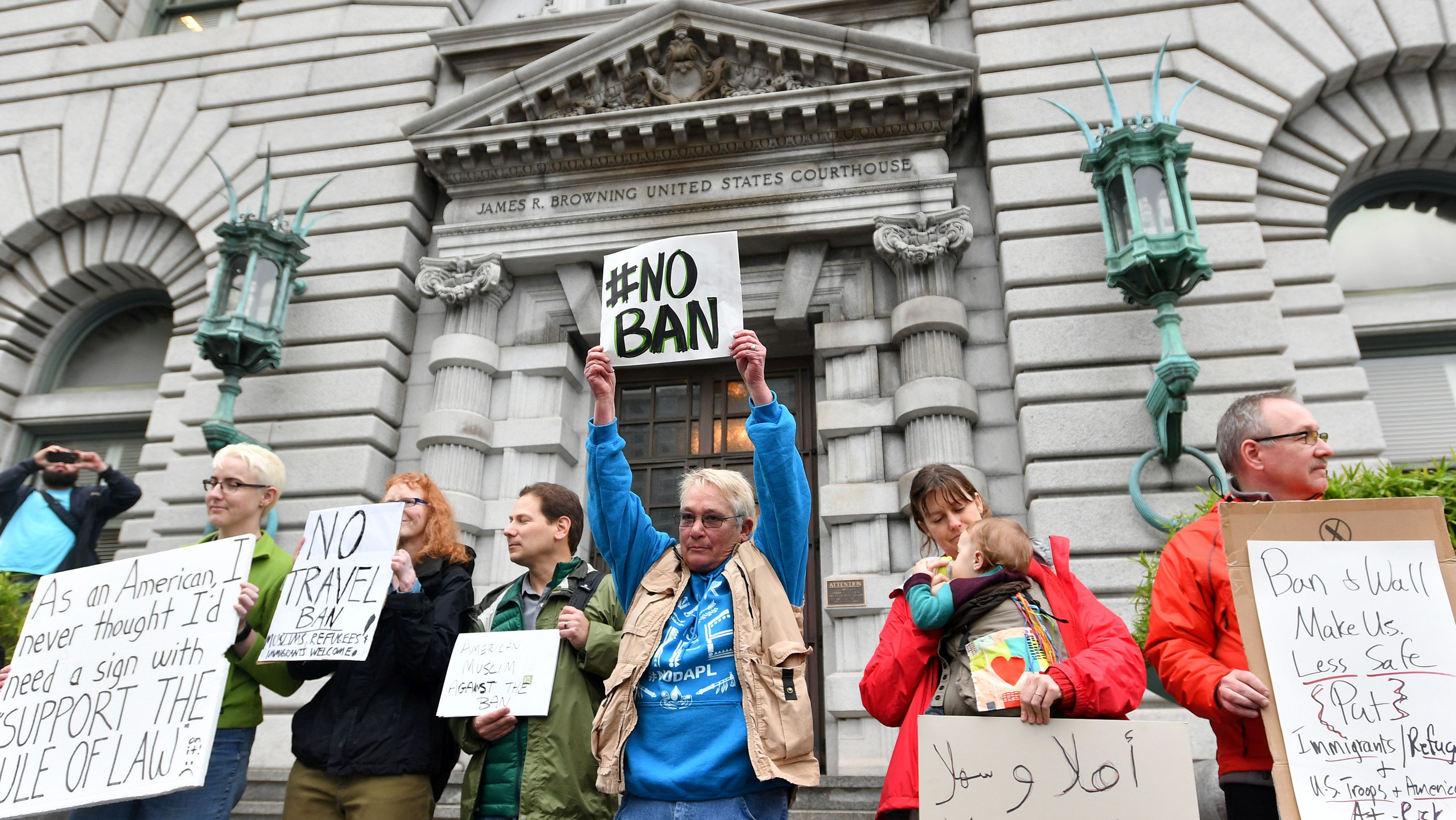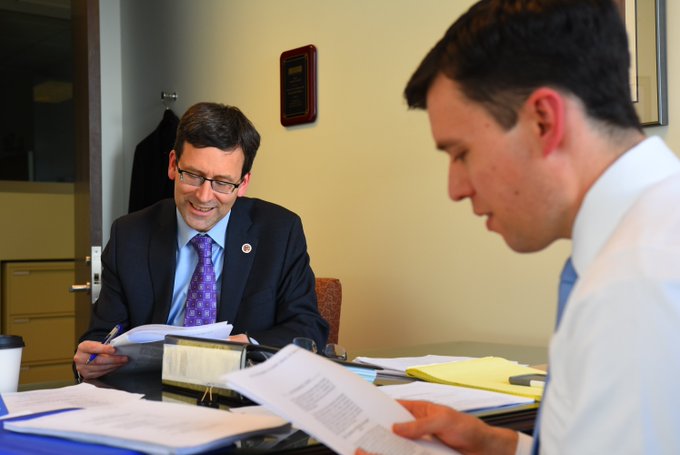
Protesters stand in front of the United States Court of Appeals for the Ninth Circuit in San Francisco, California on February 7, 2017. (Getty)
The 9th Circuit Court of Appeals has denied the government’s request to put a stay on a temporary restraining order issued by a federal court judge, putting President Donald Trump’s travel ban on hold.
That means the ban will not be enforced for now, as the case continues to play out in federal court. The Trump administration is likely to appeal to the U.S. Supreme Court. Arguments over the constitutionality of the executive order will be heard in district court.
The decision led to an all-caps reaction from Trump on Twitter, “SEE YOU IN COURT, THE SECURITY OF OUR NATION IS AT STAKE!”
In a more tempered statement, the Department of Justice said it “is reviewing the decision and considering its options. We have no further comment.”
Washington Attorney General Bob Ferguson, who brought the lawsuit, said, “Bottom line: This is a complete victory for the state of Washington.”
You can read the 29-page ruling below or by clicking here:
The unanimous ruling from the San Francisco-based court in the case of Trump vs. the State of Washington was issued Thursday afternoon, two days after attorneys from the Justice Department and the plaintiffs, the states of Washington and Minnesota argued over whether the executive order should be enforced.
The lawsuit was filed by the state of Washington in late January. The state of Minnesota later joined the lawsuit and dozens of businesses and civil rights organizations, including the ACLU, have expressed support in court filings.
Judge James Robart issued a nationwide temporary restraining order last week, halting Trump’s executive order and returning the country’s immigration policies to what they were before the president signed the order two weeks ago.
The executive order, issued January 27, barred citizens from seven Muslim-majority countries – Iraq, Iran, Syria, Libya Somalia, Sudan and Yemen – from entering the country, causing chaos at airports and protests nationwide. The order banned all citizens from six of the seven countries from entering the country for 90 days and refugees for 120 days. Syrians were barred indefinitely. Green card holders, who are legal permanent residents of the United States, were initially included in the ban, but were later allowed to enter.
The government filed an appeal, asking for the 9th Circuit to stay Robart’s temporary restraining order while arguments over the merits of the case can be heard in court.
A panel of three judges – William Canby Jr., Richard Clifton and Michelle Friedland – heard the arguments on Tuesday and wrote the ruling.
The judges found the government “has not shown that a stay is necessary to avoid irreparable injury,” and “failed to establish that it will likely succeed on its due process argument in this appeal.”
In the order, the judges wrote, “The Government has pointed to no evidence that any alien from any of the countries named in the Order has perpetrated a terrorist attack in the United States.7 Rather than present evidence to explain the need for the Executive Order, the Government has taken the position that we must not review its decision at all. We disagree.”

9th Circuit judges, from left to right Judge Michelle Friedland, Judge William Canby and Judge Richard Clifton.
The judges found that the states of Washington and Minnesota would be “substantially injured” if the ban was put back in place, even temporarily.
They said that when “the Executive Order was in effect, the States contend that the travel prohibitions harmed the States’ university employees and students, separated families, and stranded the States’ residents abroad. These are substantial injuries and even irreparable harms.”
The found that the temporary stay issued by a federal judge in Washington will not cause irreparable harm to the government.
The judges also wrote about the public interest in the case:
Aspects of the public interest favor both sides, as evidenced by the massive attention this case has garnered at even the most preliminary stages. On the one hand, the public has a powerful interest in national security and in the ability of an elected president to enact policies. And on the other, the public also has an interest in free flow of travel, in avoiding separation of families, and in freedom from discrimination. We need not characterize the public interest more definitely than this; when considered alongside the hardships discussed above, these competing public interests do not justify a stay.
Justice Department lawyer August Flentje argued the U.S. government’s side. Flentje is a career attorney in the Department of Justice currently assigned to the appellate division.

August Flentje. (Facebook)
Noah Purcell, the solicitor general for the state of Washington, argued the plaintiff’s case.
You can listen to the arguments below:
Trump has attacked Judge Robart, who issued the temporary restraining order, calling him a “so-called judge” on Twitter, and claimed that his ruling has put American citizens in danger.
The president also called it an easy decision for the Appeals Court. The White House has not yet put out an official statement on the ruling by the 9th Circuit.
The 9th Circuit created a website to provide updates and to post documents related to the case.

